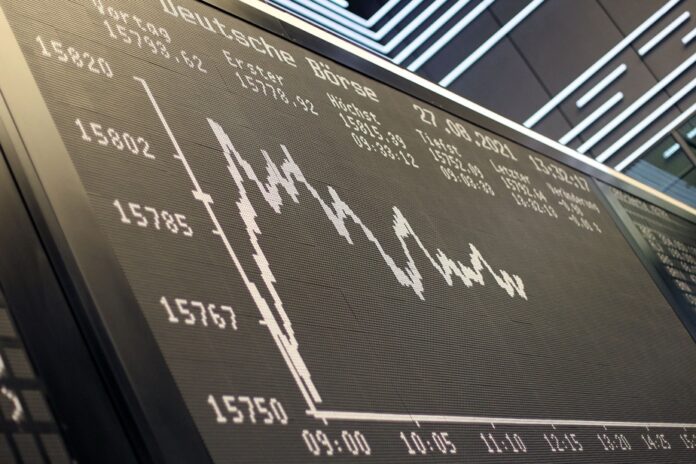(Paris) European stock markets are experiencing sharp declines on Friday with the return of fears about the financial health of European banks, which are suffering heavy losses on the markets.
The decline in the main indices has increased since the opening: Paris fell 2.15%, London 1.87%, Frankfurt 2.15%, Milan 2.46% around 6:40 a.m. (Eastern time).
The banking sector of the broader Stoxx Europe 600 index for its part fell by 4.7%, after a sharp increase in the cost of insurance against the risk of default (CDS) of several European banks.
Deutsche Bank was among the hardest hit with a 12.43% drop. Commerzbank also lost 8.99% in Frankfurt.
Deutsche Bank’s debt hedging tool now indicates a probability of default for Germany’s largest bank of 27.4% within the next five years. That probability is 19.3% for Commerzbank, according to Bloomberg.
The cost of debt default insurance has increased for most European banks, but less than for Deutsche Bank. For Barclays and Société Générale the probability is around 13%, according to these tools.
In Paris, Societe Generale shares fell 7.46%, the largest drop in the CAC 40 index, BNP Paribas also lost 6.40%. Barclays lost 5.94% in London and HSBC 4.01%. ING fell by 4.68% in Amsterdam and Nordea by 8.7% in Copenhagen.
In Zurich, Credit Suisse fell by 7.24% and UBS by 6.79%. According to the financial information agency Bloomberg, they are the subject of an investigation by American justice and suspected of having helped Russian oligarchs to circumvent Western sanctions. Contacted by AFP, Credit Suisse did not wish to comment on the information and UBS did not respond.
“Fear of contagion” in the banking sector “hasn’t gone away yet,” notes Finalto analyst Neil Wilson, pointing to the sharp decline in European bank stocks on Friday, which is “weighing on overall sentiment.” of the market.
“As I’ve said many times over the past two weeks, the crisis will only end when investors stop wondering who’s next.” “And it looks like we’re not there yet. »
A sign of investor nervousness, European government bonds, assets considered low risk, were highly prized. Germany’s 10-year debt rate, which moves inversely to the price of the bond, fell to 2.02% around 6:30 a.m. EST, down from 2.19% at Thursday’s close. .
Wall Street ended in the green on Thursday, reassured by the idea that the US Federal Reserve could soon stop its rate hikes and by a statement from Secretary of the Treasury Janet Yellen who assured that the authorities would be “ready to take additional measures if necessary” to avoid contagion in the financial sector.
In Asia, Hong Kong lost 0.67% and Shanghai 0.64%. Tokyo fell 0.13%, penalized by the rise in the yen. Inflation in Japan slowed for the first time in over a year in February to 3.1%.
For Ipek Ozkardeskaya, an analyst at Swissquote Bank, the market is polarized “between two camps: ‘financial stress and how the authorities deal with it, or promise to deal with it if new turbulence arises’ and the camp ‘fears of recession”.
Good news, however, in the euro zone, economic growth in the private sector in the euro zone accelerated in March to reach its highest level in ten months, according to an index published by S
Oil prices were also falling, often a sign that investors fear an economic recession. A barrel of Brent from the North Sea for delivery in May lost 3.28% to 73.44 dollars, while a barrel of American WTI for the same term fell 3.42% to 67.58 dollars around 6:30 a.m. (time from the east).
The euro fell against several currencies, with Europe’s single currency falling 0.94% against the dollar to $1.0729 to the euro.















